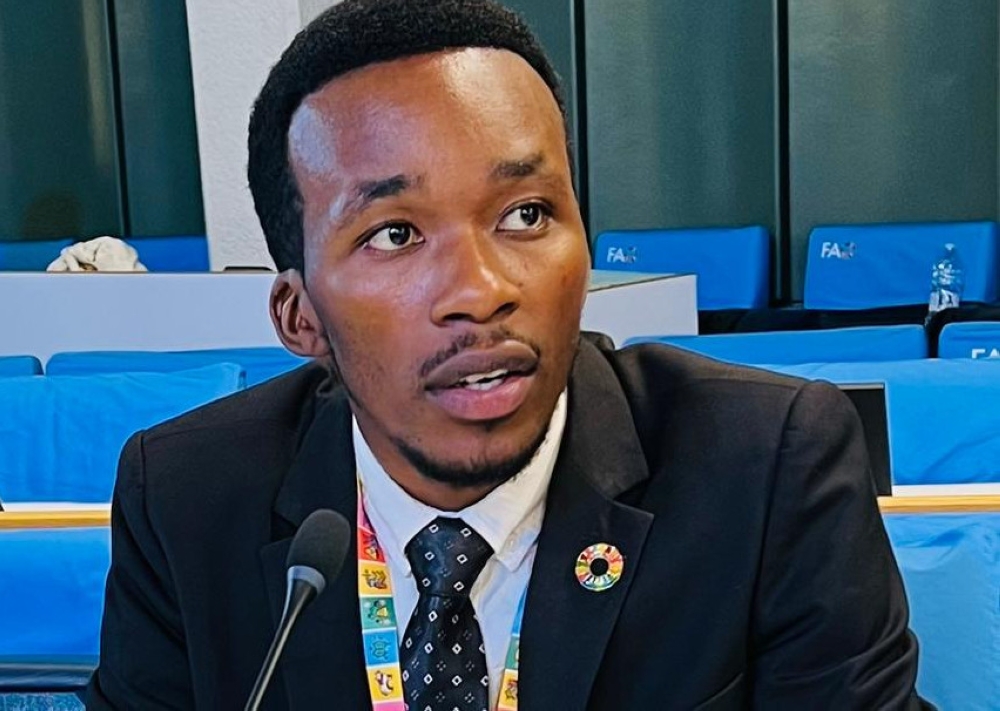

At the World Food Forum 2024, Rwandan agricultural entrepreneur (agripreneur) Jean-Claude Niyomugabo, 25, is advocating for sustainable agricultural practices, climate action, and digital integration into agriculture to address key issues that matter deeply to farmers across sub-Saharan Africa.
The event runs from October 14 through 18, at the headquarters of the Food and Agriculture Organization of the United Nations (FAO) in Rome, Italy. It brings together world experts, impassioned changemakers, and visionary leaders of all ages around the theme: "Good food for all, for today and tomorrow.”
ALSO READ: Top four RICA 2024 graduates share agricultural aspirations
"One of the pressing concerns is how climate change continues to disproportionately affect small-scale farmers, resulting in unpredictable weather patterns, reduced crop yields, and food insecurity. This forum must focus on helping farmers adapt to these challenges through innovative, climate-smart solutions,” Niyomugabo told The New Times on Tuesday, October 15.
ALSO READ: How climate change effects are leaving farmers vulnerable
A graduate of Rwanda Institute for Conservation Agriculture (RICA), Niyomugabo is also a digital content creator, social media agriculture influencer, and CEO of Agirite, a firm whose work includes leveraging the power of social media to explore the intersection between digital technology, sustainable agriculture, and youth in agribusiness.
Farmers in Africa, he said, are challenged by limited access to markets, financial services, and agricultural knowledge. Social media, digital platforms, and other technologies offer a significant opportunity to bridge these gaps, he noted.
But many farmers lack access to these tools or the skills to use them effectively.
"By addressing the digital divide, we can empower farmers with resources to connect directly with buyers, learn new techniques, and scale their businesses,” he observed.
He noted that food systems in sub-Saharan Africa need interventions that promote nutrition and food security.
"Malnutrition remains a critical issue, especially in rural areas where access to diverse, nutritious foods is limited. This forum should drive conversations around enhancing production systems that ensure food diversity and equitable distribution across the region,” he said.
Africa has the highest percentage of population facing hunger—20.4 per cent—compared to 8.1 per cent in Asia, 6.2 per cent in Latin America and the Caribbean, and 7.3 per cent in Oceania, according to the 2024 State of Food Security and Nutrition in the World report by FAO.


ALSO READ: Four key issues Kampala Declaration should consider for agri-food systems
Globally, around 733 million people faced hunger in 2023, equivalent to one in every eleven individuals. In Africa, an estimated 298.4 million people were affected, translating to one in every five residents on the continent, as per the FAO report.
Key interventions needed
To tackle the challenges facing farmers and food systems in sub-Saharan Africa, several key interventions are necessary, Niyomugabo pointed out. First, he said, promoting sustainable agricultural practices that prioritise soil health, water conservation, and biodiversity is crucial.
Farmers need access to climate-smart technologies, such as drought-resistant seeds and irrigation systems, to adapt to changing environmental conditions, he indicated, adding that governments and international organisations must provide targeted investments to support these initiatives.
Second, he said, digital agriculture must be at the forefront of the conversation.
"With more than 60 per cent of the world&039;s population expected to use social media by 2030, African farmers can leverage these platforms to access market information, training, and financial services,” he said.
To this end, he underscored the need for programmes that provide farmers with digital literacy training and access to affordable internet, enabling them to tap into the global market and increase their income.
"By empowering farmers with digital tools, they can bypass traditional barriers to market entry, resulting in improved livelihoods,” he said.
For him, food systems must focus on improving nutrition outcomes, which requires enhancing local food production systems to prioritise not just quantity but also the quality of food.
"Investments in infrastructure, such as better storage facilities, transportation networks, and processing plants, can reduce food waste and ensure that nutritious foods are more accessible. These interventions are necessary to ensure that sub-Saharan Africa can feed its growing population while combating malnutrition and poverty,” he said.
On the importance of the World Food Forum, for a region where over 70 per cent of the population relies on agriculture for their livelihood, he observed that this forum presents a unique opportunity to amplify the voices of young agripreneurs and smallholder farmers, whose input is crucial in shaping policies that affect their lives.
As agriculture becomes increasingly intertwined with technology, the forum's focus on digital agriculture is essential for sub-Saharan Africa, he said.


